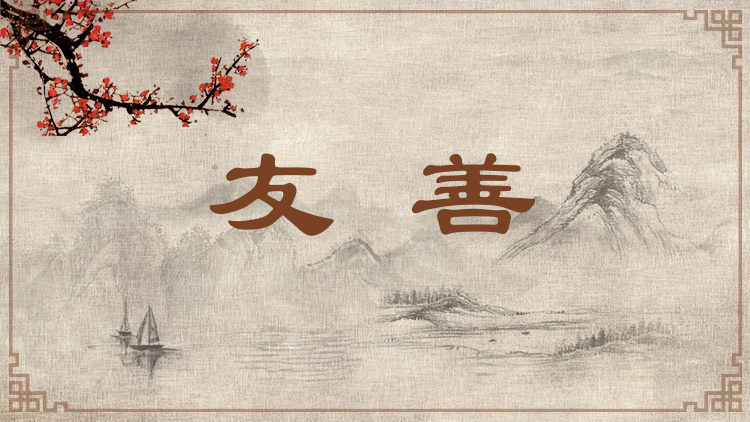友善
Friendly and Kind

友好亲近,和善共处。“友”的古字像方向相同的两只手,引申为志趣相同,互为援手;“善”本义为美善、和善。两字连用形容超越血缘的人与人之间亲密和善的关系状态。这种关系的建立是以彼此秉持共同的道义原则为前提的。时至今日,作为一种个人品质和伦理规范,它仍然被认为是构建和谐美好社会所必需的价值观。
This term means to be friendly and kind to each other in peaceful co-existence. You (友) in its ancient ideographic form consists of two hands extending in the same direction, metaphorically indicating common interest and offering a helping hand to each other. Shan (善) means to be gracious and kind. When these two Chinese characters are used together as in the current term, they denote a close and harmonious relationship among people, a bond that transcends blood ties. This kind of bond is based on the principle of righteousness commonly upheld by all parties involved. To date, as a hallmark of good character and ethical conduct, friendliness is still deemed as an essential element in the value system for building a harmonious and ideal society.
引例 Citations:
◎友者,所以相有也。道不同,何以相有也?……取友善人,不可不慎,是德之基也。(《荀子·大略》)
朋友是用来互相帮助的。如果奉行的原则不同,靠什么来互相帮助呢?……选取朋友,共进于善,不可以不慎重,这是培养道德的基础。
Friends are those who support each other if necessary. If they differ in principle, what can they depend on to help each other? ... Choosing friends should therefore be done with great care. That is the starting point for moral cultivation. (Xunzi)
◎君子先择而后交,小人先交而后择。(《文中子·魏相》)
君子是先选择值得交往之人再去结交,一般人则是结交之后再选择(对自己是否有利)。
A man of virtue selects a worthy individual first before making friends with him, whereas an ordinary man engages with people first before choosing those who would be beneficial to him. (Wenzhongzi)
推荐:教育部 国家语委
供稿:北京外国语大学 外语教学与研究出版社
责任编辑:钱耐安





